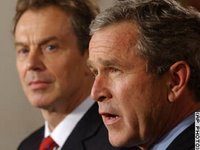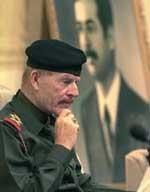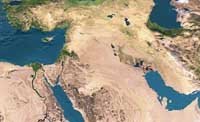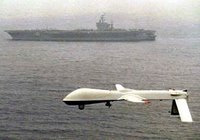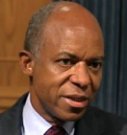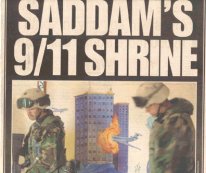Bearded cave-freak number two finally
spoke out about the goings-on in Lebanon, after nearly three weeks, and he wasn't in the mood for diplomacy:
"It is a jihad (holy war) for the sake of God and will last until (our) religion prevails ... from Spain to Iraq," al-Zawahri said. "We will attack everywhere."
The Counterterrorism Blog has
much more.
I admit to being surprised they would take such an aggressive stance while the rest of the world has rather successfully scorned Israel and America for not backing an immediate cease-fire. Zawahiri explained:
"Stand with Muslims in confronting this unprecedented oppression and tyranny. Stand with us as we stand with you against this injustice that was forbidden by God in his book (the Quran)," al-Zawahri said.
Apparently Zawahiri's copy of the Qu'ran DOES permit unprovoked firing of rockets at innocent civilians. But this rhetoric should not be surprising since AQ never misses a chance to spread their gospel of death. They were clearly waiting to see if the world leaders would organize a cease-fire before pulling the trigger.
Since al-Jazeera only ran half of the eight minute diatribe we don't know if Zawahiri specifically named Hizballah leader Nasralla in his praise-a-thon, but he did describe being "humiliated" by the Lebanese situation. The call for unity was the most surprising aspect:
"This is a transformation in the vision of al-Qaida and its struggle with the United States. It is now trying to unite Sunni Muslims, Shiite Muslims and calling for non-Muslims to join the fight,"
That according to Kamil Habib, a former(?) member of Islamic Jihad. Such calls for unity have also been coming from Saddam of late, yet there are no real signs the factions are ready to sing coumbaya based on the sectarian fighting still raging in Iraq.
The situation might be quite different if Islam wasn't so polarized, but I'm still not convinced Zawahiri's love is true. It's more akin to the handshake between Ayrian Germans and Japanese during WWII--the two surely would have attacked each other at the end. The fact AQ number two issued this tape suggests this is more lip service to the masses.
The bottom line is that AQ has sided with America and Israel regarding the uselessness of a cease-fire for the sake of a cease-fire:
The Egyptian-born physician said that the fighting between Israel and Hezbollah and Palestinian militants would not be ended with "cease-fires or agreements.
We'll have to wait and see if Kofi Annan and the international peaceniks direct their spigot of anti-war wrath towards these guys. What are the odds?
MORE 7/27/06If this
story is even partially true then Palestinian president Mahmoud Abbas and Egyptian chief of intelligence Omar Suleiman should be expecting a bin Laden fatwa against them anytime now.
Perhaps they were spooked by the
writing in the bog. King David apparently wrote Psalm 83 during a similar tense situation many thousands of years ago. According to the Living Bible Psalm 83 verse 13 begins as follows:
O my God, blow them away like dust, like chaff before the wind--
Same war, different century.
COLLABORATIVE INDECISION 7/28/06There are several columns out this morning poking fun at the conventional wisdom (and those who espouse it) of Sunnis not playing well with Shias regards the latest ME crisis. This slap down was in response to Zawahiri's tape, where he surprised a few pundits (including me) by proposing a unified fight in Lebanon despite Hizballah's Shia affiliations.
The first such comment was from Charles at
LGF based on a story he carried about an Egyptian Mufti (Sunni) siding with Hizballah. The other, carried in Powerline, linked to a Weekly Standard
story by Thomas Jocelyn.
While I hardly qualify as one of the "experts" these commenters were excoriating, I do hold the overall view that it's not the natural state for Shia and Sunni to join hands. This division has been illuminated of late by calls for unity by leaders like Zawahiri and Saddam. There would be no need to publicly beg for unity if the were already unified. Events on the ground in Baghdad also support the division theory, however the picture is somewhat clouded there by score-settling based on atrocities committed by the former secular government.
My comments have been solely based on readings and observations. History shows a host of regional rivalries between Sunnis and Shia. The rift is real. The question has always been one of whether they can bridge the divide.
Common sense would suggest they should. Two facts are not in dispute by anyone--both seek the removal of western influence from the region and both seek a spread of Islam. Mr. Jocelyn argues effectively that such a thing is already occurring, and offers an evidentiary exchange between a Sudanese Sunni and Iranian Shiite in courtroom testimony in the 90s:
Q: What happened when Sheikh Nomani came to the guesthouse in Riyadh City? A: In front there they sit down and some of the higher membership, they got meeting and talking with the Sheikh Nomani and Hamadabi.
Q: Was Bin Laden there? A: Yes.
Q: Can you tell us what was discussed at that meeting? A: They [Nomani and Hamadabi] talk about we have to come together and we have to forget the problem between each other and each one he should respect the other because our enemy is one and because there is no reason to fight each other.
Q: Who did they describe the enemy as being? A: They say westerns. [sic]
This same topic was discussed at length in Yosef Bodansky's
book about bin Laden, whereupon he provides great detail about the actions of Sudanese leader Hassan Turabi was his vision of a unified Islam against the west.
However, the comment above, "...we have to forget the problem between each other..." seems to provide solid evidence of how deep the divisions run. In light of the current situation, if they can't mend fences and work together now they never will.
So the general question remains the same (and it's non-partisan)-- can they? The shared goals alone should be enough to force it, but first they must get past tbe many rivalries, fiefdoms, turf wars and tribal feuds. Perhaps the first signs might come from Iraq, where the sectarian strife makes Hamadabi's comments appear more a pipe dream.
MORE 7/28/06Here is a
link to one translation of Zawahiri's tape. As Evan Kohlman points out, we should not jump to too many conclusions, since these translations can sometimes vary. But a few things seem beyond interpretation.
For instance, he only mentioned Sunni Arabs by name, with emphasis on al-Zarqawi. It might be significant that he included the two deceased Mohammeds--Atef and Atta, since they've been old news since 2001. If there was anything sinister in this tape, that would seem to be it.
He didn't mention Nasrallah or other known Shia in the tape. Matter of fact, if the translation is correct it sounded more like an invitational call for Shias to join al Qaeda.
 In case you missed it, the Washington Post had a lengthy story in their Sunday edition on a subject many folks seem to be allergic to--bioterrorism.
In case you missed it, the Washington Post had a lengthy story in their Sunday edition on a subject many folks seem to be allergic to--bioterrorism. 



